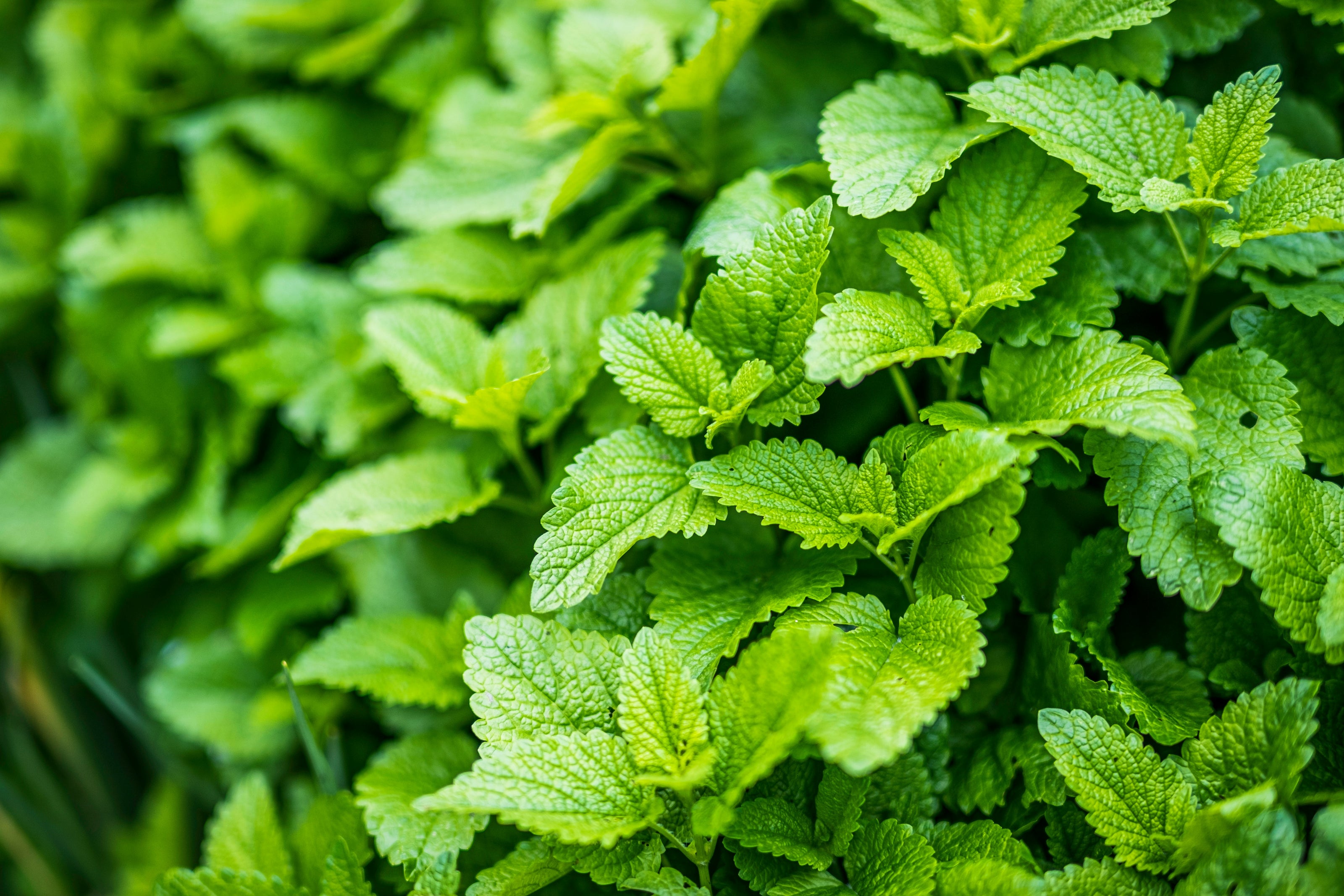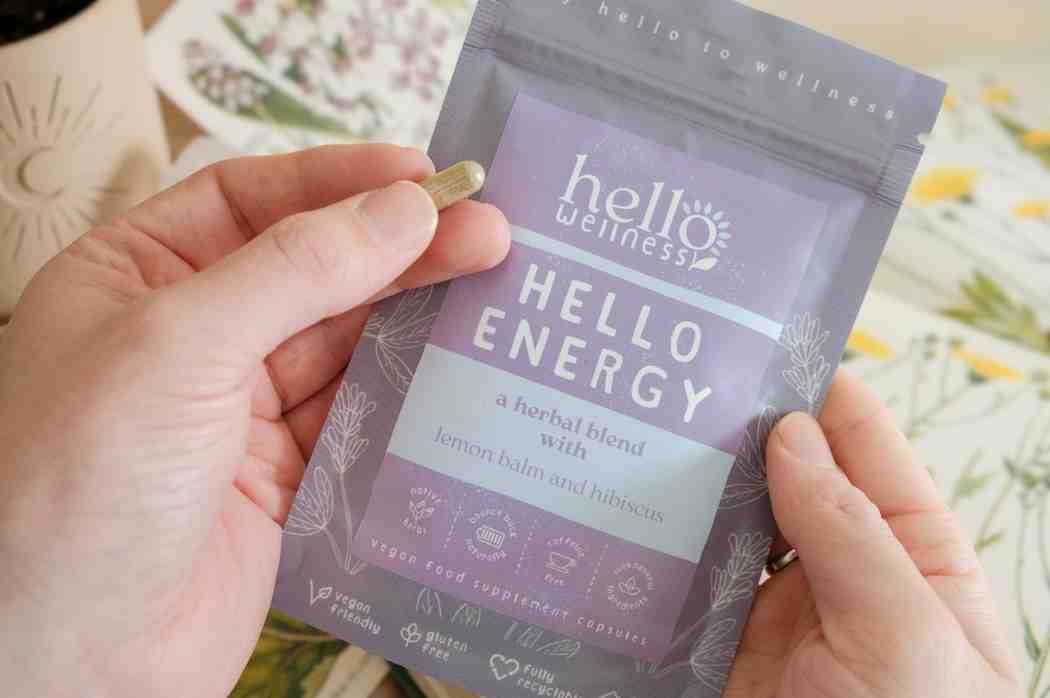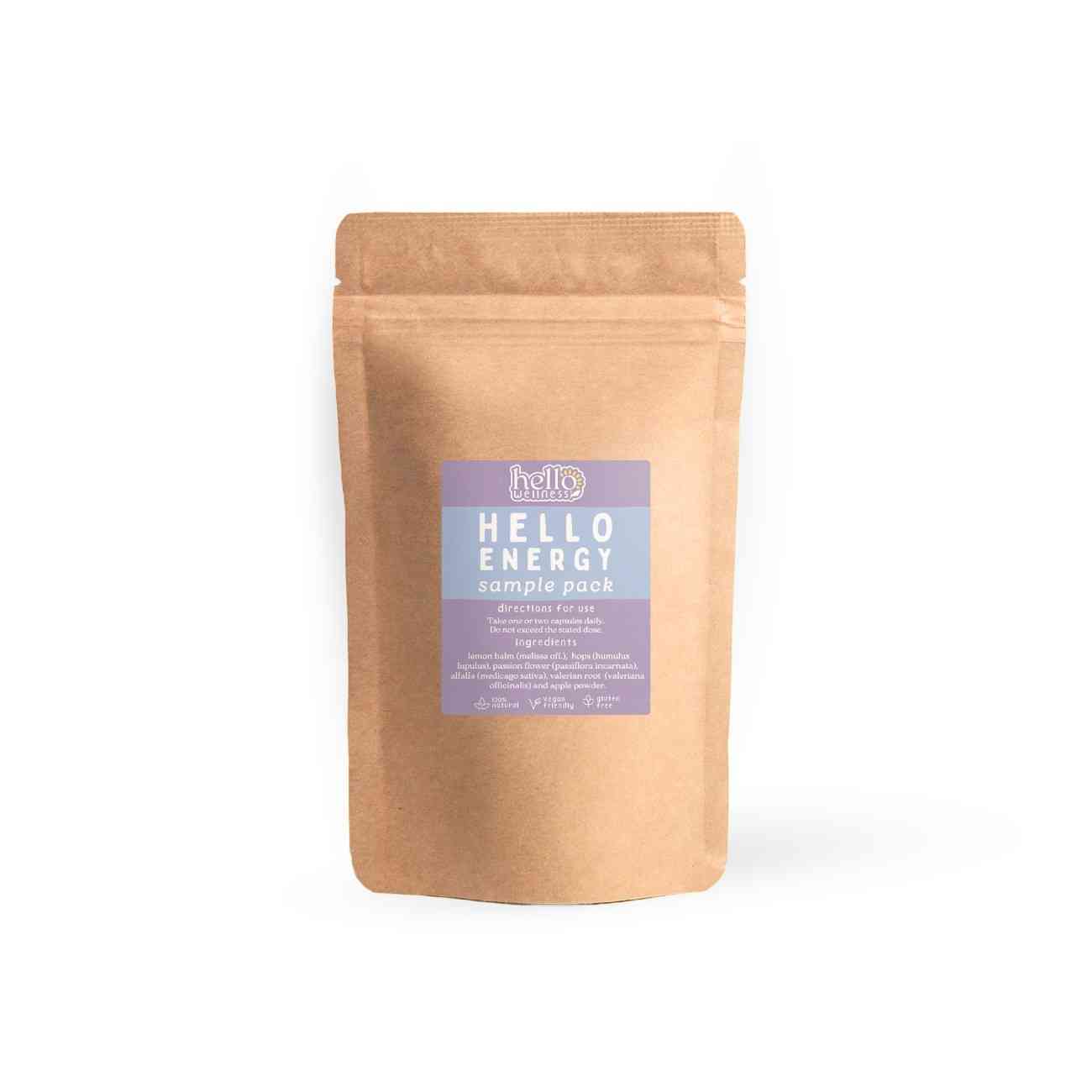Natural Remedies for Stress
Do you ever feel overwhelmed, like the weight of everything is pressing down on you? As if your mind and body are constantly on high alert, with no time to relax or breathe? That feeling is often the result of stress.
Stress isn’t just a mental state—it’s your body’s natural response to pressure or threat. While occasional stress can be helpful in small doses, chronic stress can take a serious toll on your physical and emotional health. It can affect your sleep, mood, energy levels, and even your immune system.
At Hello Wellness, we specialise in creating expertly formulated herbal remedies designed to support your health and well-being. In this guide, we’ll explore what stress is, what causes it, and the most effective natural treatments to help you manage stress, restore balance, and feel more like yourself again.

What is Stress?
Stress is the body’s natural reaction to any situation that requires adjustment or response. It can be triggered by both positive and negative events—anything from a tight deadline at work to a big life change like moving or getting married.
When you experience stress, your body releases hormones like cortisol and adrenaline, which activate the “fight or flight” response. This can lead to physical symptoms such as increased heart rate, tense muscles, and faster breathing. Emotionally, stress may cause anxiety, irritability, or feeling overwhelmed. Mentally, it can make it harder to focus or make decisions.
Common Symptoms of Stress Include:
- Irritability or Mood Swings – Feeling easily frustrated, anxious, or overwhelmed.
- Fatigue – Constant tiredness or low energy, even after a full night’s sleep.
- Muscle Tension and Headaches – Tight shoulders, neck pain, or frequent tension headaches.
- Sleep Problems – Difficulty falling asleep, staying asleep, or experiencing restless sleep.
- Difficulty Concentrating – Trouble focusing, forgetfulness, or a racing mind.
Common Causes of Stress
1. Work Pressure
One of the most common sources of stress is job-related pressure. Tight deadlines, long hours, high expectations, lack of control, or unclear job roles can all contribute to feelings of overwhelm. Additionally, workplace conflicts or job insecurity can heighten stress levels, leaving individuals feeling anxious or burnt out. Even jobs that are rewarding can become stressful when demands exceed a person’s ability to cope.
2. Financial Worries
Money is a leading source of stress for many people. Struggling to pay bills, managing debt, or dealing with unexpected expenses can create constant anxiety. The pressure to maintain a certain standard of living, support a family, or save for the future can also weigh heavily on individuals. Financial stress can feel inescapable and often impacts other areas of life, such as relationships and mental health.
3. Relationship Issues
Conflict with a partner, family member, friend, or colleague can be deeply stressful. Communication problems, lack of support, or unresolved tensions can lead to emotional strain. Stress in relationships can also arise from major life changes like divorce, breakups, or the death of a loved one. Because humans are social beings, disruptions in personal connections can greatly affect emotional stability and increase overall stress.
4. Health Concerns
Chronic illness, injury, or even a sudden diagnosis can be a major source of stress. Dealing with pain, managing treatment, or facing uncertainty about recovery takes a toll on both the body and the mind. Additionally, caring for a sick loved one can lead to caregiver stress. Even smaller health issues, when persistent, can drain energy and create ongoing worry.
5. Major Life Changes
Significant life events—both positive and negative—can trigger stress. Moving to a new city, changing careers, getting married, or becoming a parent are all life-altering experiences that can cause emotional upheaval. Even changes that are planned and desired require adjustment, which can feel overwhelming. The uncertainty that comes with change can create feelings of instability, even when the outcome is positive.
6. Lack of Time or Overcommitment
Feeling like there’s never enough time in the day is a common stressor. Many people juggle work, family, social obligations, and personal goals, leaving little room for rest. Overcommitting and not setting boundaries can lead to exhaustion and feelings of failure. The constant rush and pressure to keep up can cause chronic stress and make it difficult to relax or enjoy life.
7. Environmental and Social Factors
External surroundings can also contribute to stress. Living in a noisy, crowded, or unsafe environment can create a constant sense of unease. Exposure to negative news, social media comparison, or societal pressures can also impact mental well-being. These stressors may be subtle or ongoing, but they accumulate over time and affect both mental and emotional health.
Signs You May Need Support Managing Stress
Constant Fatigue
If someone feels exhausted all the time, even after sleeping well, it could be a sign that stress is depleting their energy. Chronic stress keeps the body in a constant state of alert, which can wear it down physically and mentally.
Trouble Sleeping
Difficulty falling asleep, staying asleep, or waking up feeling unrested are common signs of stress overload. Sleep issues can create a vicious cycle, as lack of rest makes stress harder to manage.
Irritability & Mood Swings
Frequent irritability, frustration, or emotional outbursts may indicate that someone is feeling overwhelmed. Stress affects emotional regulation, making small problems feel much bigger than they are.
Trouble Concentrating
Stress can make it hard to focus, remember things, or stay organized. If someone is finding it difficult to complete tasks or is constantly distracted, they may need support managing their mental load.
Physical Symptoms
Headaches, tense muscles, stomach issues, or frequent illness can all be stress-related. The body often sends physical signals when stress levels are too high and not being properly managed.
Reduced Motivation
A persistent lack of motivation may be tied to low dopamine levels, which are influenced by factors like chronic stress, poor diet, and lack of physical activity. Nutrient deficiencies, particularly in iron, B vitamins, and omega-3s, can also impact dopamine production, leading to decreased drive and enthusiasm.
Developing a routine that includes goal-setting, adequate rest, and a balanced diet can help boost motivation. Engaging in rewarding activities, practicing self-care, and maintaining social connections can further enhance dopamine levels. Regular exercise, particularly aerobic activities, is known to naturally increase motivation by stimulating the release of endorphins and neurotransmitters essential for drive and focus.
Withdrawal or Isolation
Pulling away from friends, family, or activities that were once enjoyable may be a sign of stress turning into burnout or depression. Isolation can worsen stress and make it harder to cope.
Feeling Overwhelmed or Hopeless
If someone often says they "can't handle it anymore" or feels hopeless about their situation, it's a serious sign that stress has reached a critical point. At this stage, professional support is often necessary.
Herbs for Stress
-

Lemon Balm
Lemon BalmLemon Balm (Melissa officinalis) is a fragrant herb from the mint family that has been used for centuries to promote relaxation, improve cognitive function, and support overall well-being. Known for its fresh, citrusy scent and calming properties, Lemon Balm is a powerful botanical that enhances mood, reduces stress, and supports mental clarity.
-

Hops
Hops, commonly known for their role in brewing beer, are also a powerful herbal remedy for stress and anxiety. Traditionally used for their calming properties, hops contain natural compounds that act as mild sedatives, helping to relax the nervous system and promote restful sleep. They are especially effective when combined with other soothing herbs like valerian or chamomile.
Natural Remedies for Stress
The good news is that stress is often manageable with lifestyle adjustments and targeted natural remedies. Here are some easy ways you can naturally manage stress:

Prioritise Quality
Sleep
Getting enough restful sleep is one of the most effective ways to reduce stress. During sleep, the body repairs itself and the mind processes emotions. Lack of sleep increases cortisol levels, making you more reactive and anxious. Aim for 7–9 hours of sleep per night with a consistent bedtime routine.
Avoid screens before bed, limit caffeine in the afternoon, and create a calm, dark sleeping environment. Good sleep hygiene not only helps reduce daily stress but also builds resilience, making it easier to handle life’s challenges with a clearer, more balanced mindset.

Social
Connection
Strong relationships are key to emotional health and stress management. Talking to someone you trust—whether a friend, family member, or support group—can help you process feelings, feel heard, and gain perspective.
Social interaction boosts oxytocin, a hormone that reduces stress and fosters emotional resilience. Isolation, by contrast, can make stress feel overwhelming. Make time for regular connection, whether through a quick phone call, shared meal, or walk with a friend. Even brief social interactions can lift your mood and remind you that you’re not alone in what you’re facing.

Spending Time
In Nature
Connecting with nature is a simple yet powerful way to reduce stress. Whether it’s walking in a park, sitting by water, or gardening, being outdoors has a grounding effect on the mind and body. Nature reduces cortisol levels, eases anxiety, and improves mood and focus.
Natural settings also encourage slower, more mindful living—helping to break the cycle of constant stimulation. Even brief exposure, such as a 10-minute walk among trees, can offer noticeable benefits. Make time regularly to unplug and reconnect with the natural world around you.

Deep
Breathing & Meditation
Mindful breathing and meditation help calm the nervous system and bring your attention to the present moment. These practices slow the heart rate, reduce muscle tension, and lower stress hormone levels. Even a few minutes of focused breathing each day—like inhaling for four counts, holding for four, and exhaling for four—can create a sense of calm.
Meditation apps, guided audio, or silent reflection can all support mental clarity and emotional balance. Over time, these techniques rewire the brain to respond to stress with greater ease and awareness.

Get Regular
Exercise
Physical activity is a powerful stress reliever. When you exercise, your body releases endorphins—natural mood boosters that improve mental well-being. Regular movement helps regulate stress hormones like adrenaline and cortisol, while also improving sleep and energy levels.
You don’t need intense workouts; even walking, yoga, or dancing can make a big difference. Exercise also provides a healthy distraction from worries, allowing your mind to reset. Incorporating physical activity into your daily routine—even for 20–30 minutes—can dramatically improve your ability to manage stress over time.

Use Natural
Supplements
Certain herbs and nutrients have been scientifically shown to support the body’s response to stress. Magnesium plays a key role in calming the nervous system and regulating stress hormones, while B vitamins are essential for maintaining energy levels and supporting emotional balance.
Herbs like Lemon Balm help the body adapt to stress by balancing cortisol levels and promoting resilience.
At Hello Wellness, we offer expertly formulated stress-relief supplements that combine these powerful ingredients to help you feel calmer, more balanced, and better equipped to handle life’s daily pressures.
Other Natural Ways to Combat Stress
Creative Outlets
Engaging in creative activities like painting, writing, music, or crafting allows the brain to shift away from worry and into a state of flow. Creative expression provides a safe and healthy outlet for emotions, helping to process stress in a non-verbal, intuitive way. It also boosts dopamine, the feel-good neurotransmitter linked to motivation and pleasure. You don’t need to be an artist—just doing something expressive without judgment can be incredibly therapeutic. Regular creative time can offer joy, relaxation, and a sense of personal fulfillment.
Laughter & Joy
Laughter truly is good medicine when it comes to managing stress. It lowers cortisol, boosts endorphins, and relaxes the body. Watching a funny show, spending time with playful people, or finding humor in everyday life can all reduce tension. Joyful activities—anything from dancing to playing games—also shift the focus away from stress and back to the present. Prioritizing fun may seem unimportant during busy or difficult times, but it’s essential to emotional balance and resilience. Schedule time to do what makes you smile.
Limiting Stimulants & Screens
Too much caffeine, sugar, or screen time—especially social media—can heighten feelings of anxiety and overwhelm. These stimulants increase cortisol and disrupt sleep, making it harder to manage stress. Constant notifications and digital overload also keep the mind in a state of alert, reducing your ability to relax and recharge. Try setting boundaries, such as caffeine curfews, screen-free mornings, or digital detox hours in the evening. Replacing screen time with quiet, restorative activities can significantly improve mental clarity and stress levels.
Establishing Routines & Boundaries
Having a daily routine provides a sense of structure and control, which can greatly reduce stress. Predictable habits like meal times, exercise, and sleep help regulate your body’s internal clock and reduce decision fatigue. Equally important is setting boundaries—saying no to extra commitments, protecting time for yourself, and defining work/life limits. Boundaries help prevent burnout and allow space for rest and reflection. A simple, well-balanced routine builds a foundation for resilience and ensures that your basic needs are consistently met, even during stressful periods.
Blog Posts About Stress
-

Thriving Under Pressure: Why Stress Drains Some and Fuels Others
Read about StressWhy is it that some people thrive under pressure, while others burn out? The same challenge that motivates one person to rise to the occasion can be completely overwhelming for another.
-

Take Control of Your Energy: April’s Practitioner Guide
How to Take ControlFeeling drained, overwhelmed, or running on empty? The way you manage stress and energy can make all the difference. Here are four simple, science-backed steps to restore balance and build resilience.
-

Why You’re Always Tired (And What to Do About It)
Read about FatigueIf constant fatigue has you feeling drained, you’re in the right place. Guest practitioner Sarah Elisabeth explores the hidden causes of exhaustion and offers simple, natural solutions to boost energy.
Discover Hello Energy
Stress FAQ
What is stress?
Stress is the body’s natural response to any demand or challenge. It can be caused by physical, emotional, or psychological pressure. While short-term stress can be helpful in motivating action, chronic stress can negatively impact your health and well-being.
What are common symptoms of stress?
Stress can affect the body and mind in many ways. Common symptoms include:
- Fatigue
- Irritability and mood swings
- Trouble sleeping
- Muscle tension & headaches
- Difficulty concentrating
- Digestive issues
- Feeling overwhelmed or anxious
What causes stress?
Stress can be triggered by many factors, including:
- Work pressure or job insecurity
- Financial difficulties
- Health issues
- Relationship problems
- Major life changes (e.g., moving, divorce, loss)
- Overcommitment and lack of rest
- Environmental or societal pressures
How can stress affect my health?
Chronic stress can weaken the immune system, disrupt sleep, affect digestion, and increase the risk of anxiety, depression, heart disease, and other health conditions. It can also impair memory and concentration over time.
What are some natural ways to help manage stress?
There are several effective, natural ways to reduce stress:
- Get regular, restful sleep
- Exercise regularly
- Practice mindfulness or meditation
- Spend time in nature
- Connect with supportive people
- Engage in hobbies or creative activities
- Limit caffeine, alcohol, and screen time
- Maintain a balanced daily routine
Can diet and supplements help with stress?
Yes. A balanced diet rich in whole foods, healthy fats, and essential nutrients can support stress management. Supplements like magnesium, B vitamins, and adaptogens (e.g., ashwagandha or rhodiola) may also help regulate stress hormones and improve resilience when used appropriately.
When should I seek professional help for stress?
If stress is interfering with your daily life, relationships, or health, or if you feel overwhelmed, anxious, or hopeless for extended periods, it’s important to speak with a healthcare provider or mental health professional. Early support can prevent more serious issues from developing.
Is all stress bad?
Not necessarily. Acute stress—like meeting a deadline or preparing for a big event—can improve focus and performance in the short term. The problem arises when stress is frequent or ongoing, and the body doesn’t get time to recover. That’s when it becomes harmful.
How can Hello Wellness help me manage stress?
At Hello Wellness, we offer expertly formulated natural remedies designed to support your body’s response to stress. We'd recommend trying Hello Energy, a natural supplement designed to support the body's natural response to stress.

Shed the stress with Hello Energy
If you’re tired of feeling stressed it's time to take control of your health and wellbeing. Simple lifestyle changes, the right diet, and natural supplements can help restore calm, energy and focus.
At Hello Wellness, we believe in the power of nature to support brain health and cognitive function.
Hello Energy is a herbal blend for fatigue and energy levels, with lemon balm, hops and gentian root that restore energy and support mental and physical wellbeing. Take one capsule daily to support your energy levels naturally and keep your nervous system calm. The blend of 100% natural ingredients helps your bodies resistance to stress and supports good cognitive function too.
Start your journey toward well-managed stress today.
Hello Wellness UK
Hello Energy







-

100% Natural Ingredients.
No artificial chemicals, no fillers, just herbs native to the UK.
-

Naturopathically Formulated.
Unique combinations of active ingredients and adaptogens refined throughout our natural health practitioner & founder’s 25 years of experience.
-

For Everyone.
Everybody and every body is different. Our active ingredient and adaptogen-filled formulations listen to deliver what it needs, when it needs it.
-

For the Planet.
Choosing Hello Wellness is choosing sustainably-sourced UK native herb varieties, and award-winning biodegradable pots.











